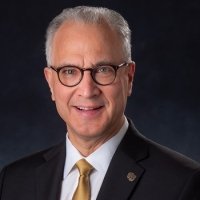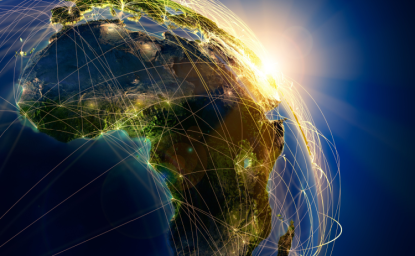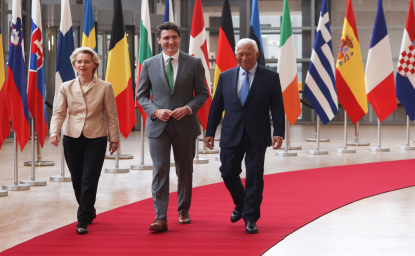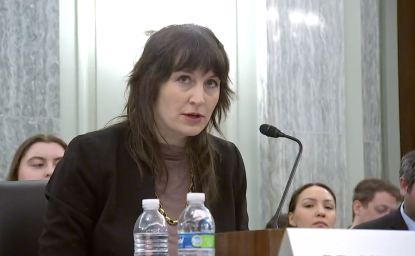Ten Reasons Why the US Should Renew AGOA
Mark Kennedy
Director, Wahba Institute for Strategic Competition
It would be a shame to simply renew the African Growth and Opportunity Act (AGOA). There are at least 10 reasons why the US should expand trade more robustly with the continent.
It is economically good for the US. Trade is mutually beneficial. A bipartisan group of US senators recently wrote that “By lowering the cost of trade and encouraging investment in the region, AGOA creates valuable opportunities for US businesses, workers, and consumers.”
Africa will be increasingly consequential. Africa is on a path to be a quarter of global population by 2050 and 39 percent by 2100. The World Bank notes the African Continental Free Trade Area agreement that recently took effect “connects 1.3 billion people across 55 countries with a combined gross domestic product valued at US $3.4 trillion.” It could accelerate development propelled by intercontinental trade.
To avoid forfeiting Africa to China. The People’s Republic of China (PRC) is gaining influence in Africa because of America’s negligence. America ranks fourth in foreign direct investment (after China, Russia and the UAE). US trade with African states is just one-fifth the size of China-Africa trade. China has invested at least 2.5 times as much in infrastructure development as the Western world combined.
To protect future exports. The US is allowing heavily subsidized telecommunications companies such as Huawei to gain dominance in Africa. This could hamper export opportunities in African markets many US digitally driven products and services.
To advance American values. The continent being wired primarily by Huawei increases chances that any smart city functions adopted will be structured to control the citizens rather than empowering them. Being such a laggard in trade with Africa makes it hard for the US to establish a pattern of commerce according to the rule of law. In the countries where AGOA has benefited African countries, it as created opportunities for women.
Enhance Critical Minerals Supply Chain Resilience Without Being Exploitive. Africa is a rich source of critical minerals essential to the energy transition. It will be attentive as to whether America is focused on just accessing the continent’s rich natural resources or whether it remains committed to development and humanitarian aid together with expanded trade to help its citizens prosper.
To avoid future strife. With higher incomes, rich nations have more incentive to invest in artificial intelligence (AI) and automation to improve their productivity, making them less reliant on low skill labor. While emerging markets can also benefit from AI, they gain little from replacing low-skill labor. With 43% of Africans lacking electricity, its young population will have difficulty developing skills for a digital world. The combination of less demand for unskilled jobs and a significant growth in supply of such workers presages significantly higher migration or rising conflict unless much more is done to alleviate poverty in sub-Sahara Africa. The continent already represents half the countries that World Banks lists a fragile, conflict afflicted and violent.
National security. Rising PRC influence in Africa has many consequences, including its growing military footprint. The PRC has bases in Djibouti and in Equatorial Guinea. It is seeking a naval port on Africa’s Atlantic coast. The continent’s reliance on Huawei leaves Africa vulnerable to Chinese spying.
To show America’s heart. Africa continues to be afflicted by extreme poverty. The expansion of trade has lifted hundreds of millions out of poverty, but AGOA has not been robust enough to help the continent. The 35 AGOA nations collectively account for about 1% of American imports, less than before the act was passed. America needs an even more robust approach to trade to show its heart.
To Lead. Seven decades of American leadership demonstrates that doing so is highly beneficial to the peace and prosperity of both the US and the globe. While not renewing AGOA is the opposite of leadership, it will take enhancing AGOA in coordination with the Millennium Challenge Corporation and the US International Development Finance Corporation to demonstrate it.
The US must re-energize its efforts in Africa and not leave the continent to China and Russia
Klaus Larres
Fellow, Global Europe Program and Kissinger Institute on China and the United States
There is no question that Washington should engage with the important US-African trade and economic summit in Johannesburg in early November. Fortunately, US Trade Representative Katherine Tai has not only decided to participate in the meeting, but also to serve as its co-chair.
The voices coming from Congress during the past few weeks have not been persuasive when they declared loudly that the US should not participate in this crucial meeting due to South Africa’s (and other African nations) close relationship with Putin’s Russia.
In fact, this is exactly why the US should be a strong presence in Johannesburg. The US cannot afford to neglect this precious opportunity to counter the many pro-Russian sentiments on the African continent.
There are two other important reasons why US participation in the summit serves Washington’s interests.
Intensifying trade relations with Africa (and not least with South Africa, the continent’s economically most dynamic country) is advantageous in its own right. Expanding and upgrading trade and economic relations with Africa will benefit both sides. Continued access to the many precious raw materials the US needs from Africa is only one of the many advantages Washington would gain.
Not least, it will breathe new life and energy into the African Growth and Opportunity Act (AGOA), President Biden’s flagship trade program for Africa, which should be extended beyond its expiration date of September 30, 2025.
Above all, the US should not leave Africa to China. China’s commercial engagement goes back to the late 1990s and intensified with Xi Jinping’s 2013 Belt and Road Initiative. Since then, China’s economic and trade relations with virtually every African nation have taken off, particularly with Ethiopia, Angola, and Zambia.
Beijing’s two-way trade with Africa is four times as high as Washington’s and China’s foreign direct investment in Africa is twice as much as the US invests. China thus creates jobs for hundreds of thousands of African workers and greatly supports Africa’s manufacturing base. In return, China obtains substantial amounts of raw materials from the African continent.
Consequently, China’s political influence in Africa has grown immensely and Beijing has also started to develop its military and naval presence on the continent. China’s first military base abroad was completed in Djibouti in 2017, and a second base in Equatorial Guinea and naval ports on Africa’s Atlantic coast seem to be in the planning stages.
Washington should not sit idly by while as this is happening. The political-democratic and cultural image of the US in Africa is still strong. But the African nations need trade and investments. The US (and the 27 European Union countries) can provide much more of either, if only they get their act together.
The AGOA summit in Johannesburg is a great opportunity to demonstrate Washington’s re-energized efforts to win back the minds, hearts, and not least, the economic cooperation of African nations.
AGOA Summit Offers Change to Ramp Up US-African Trade Relationship
Keith Rockwell
Global Fellow, Wahba Institute for Strategic Competition
The Africa Growth and Opportunity Act (AGOA) summit in Johannesburg this week offers a real opportunity for the United States to upgrade its relationship with Africa. It must not be squandered.
AGOA is a preferential trade agreement between the US and 35 sub-Saharan African countries that was approved by Congress in 2000 and renewed under the Obama administration in 2015. It is set to expire in 2025. African countries have not benefitted from AGOA to the extent they would like, but they are all strongly in favor of renewing–and improving–the accord as soon as possible.
According to the US International Trade Commission, AGOA has reduced poverty and created jobs in Africa. Yet these gains were not universally shared. South Africa, Kenya, and Lesotho have profited through their participation in AGOA. Exporters of automobiles and wine (from South Africa) and textiles and apparel have also done well. AGOA textiles and apparel exporters employ an estimated 240,000–290,000 workers, many of whom are women.
Everyone agrees AGOA could deliver more. Although it covers 97% of US import products such as fruits, it does not include dairy products, sugar, meat, and steel. Of the $44.8 billion in goods the US imported from Africa in 2021, only $6.7 billion entered the country under AGOA. This low utilization rate is one of the issues that needs to be addressed at the summit. Almost half of eligible countries now post utilization rates of 2% or less. Half of beneficiary countries export less than $1 million to the US.
The low rate of utilization is linked to protectionist US farm policies and a lack of preference for African exporters for energy and mineral-based products, where US global tariffs are low. But the primary reason for low rates of utilization is that many African countries lack the capacity to manufacture products that would be eligible for the preferential tariffs.
Many African countries are also frustrated that AGOA is a unilateral, non-binding preference arrangement. Washington can, and does, strip benefits away from African countries that fail to reach eligibility criteria on economic and political policies, security issues, and respect for labor and human rights. Offering trade preferences to unsavory governments is politically toxic, but the sudden termination of benefits also undermines the trading predictability and stability that AGOA is designed to foster. This hampers investment and limits the ability of African companies to participate in global supply chains and value-added manufacturing.
The two sides also need to agree on how to structure a future AGOA program to better reflect the dynamism being generated by the African Continental Free Trade Area. The AfCFTA came into force in 2019 and encompasses 55 countries and a market of 1.3 billion people. By tearing down barriers between African countries, the continent’s leaders hope to turbocharge intra-African trade, which today is at a lamentable 14.4% of total African trade. Fewer barriers between these countries would help lift 30 million people from poverty and boost continental GDP by $450 billion, or 7%, by 2035 according to the World Bank and African Development Bank.
Creating a preferential agreement with so vast a trading bloc is complicated by the wide diversity of these economies, but also by the eligibility requirements. As African companies become better integrated into supply chains it will become even more complicated.
Encouraging investment and private sector partnerships in Africa would help integrate entrepreneurs (particularly smaller and medium sized companies) into global trade. One possible area for future cooperation would be in medicines and medical products where there is a substantial need for expanding domestic production and where many African companies have shown great promise. US Trade Representative Katharine Tai, who will lead the delegation, maintains that promoting more inclusive trade is one of her objectives. Facilitating greater participation of smaller companies, many of which are run by women, would be a significant step in this direction.
Perhaps the biggest obstacle to getting the AGOA conversations started in Washington has been a lack of urgency. But China’s rise to a position of near dominance in Africa has set off alarm bells on Capitol Hill. China is the largest source of investment, lending and trade for Africa. China’s 2021 trade with Africa of $250 billion, far exceeded the $62 billion US-Africa trade volume.
The good news is that the issue is capturing more attention in Congress. Sen. John Kennedy (R-La.) introduced a bill in September that would extend AGOA for another 20 years from 2025. Other senators, including Sen. Chris Coons (D-Del.) are making this issue a priority. Congressional advocates for improving AGOA are engaged in some creative thinking, including the possibility of treating all AfCFTA members as AGOA partners or including other legislation on an AGOA bill, including measures related to trade in critical raw materials. In introducing his bill, Sen. Kennedy stressed the importance of AGOA in checking China’s rise in Africa.
This week’s meeting is an important one for Ambassador Tai as well. She certainly could use a win. The broader US Generalized System of Preferences expired at the end of 2020 and there has been little effort to revive it. Just two weeks ago, US and European Union negotiators failed to reach agreements on sustainable steel trade and critical raw materials that would have enabled closer cooperation on electric vehicle production. Many in Europe lay the blame for this at the feet of Ambassador Tai. The fact that deputy US Treasury Secretary Wally Adeyemo has been dispatched to Brussels and Berlin this week to smooth things over with European partners can be taken as sign that there is not great confidence in Ambassador Tai’s ability to close a deal.
The AGOA meeting in South Africa this week will not be the last before the future of AGOA is determined. But it will provide clear signals about whether the US and Ambassador Tai are serious about intensifying trade and investment relations with Africa, or whether they are content to take a backseat to China on a continent that is among the world’s most dynamic and strategically important.
Authors


Richard M Krasno Distinguished Professor in History & International Affairs at the University of North Carolina at Chapel Hill

Director of the Information and External Relations Division and Chief Spokesman at the World Trade Organization (retired)

Wahba Institute for Strategic Competition
The Wahba Institute for Strategic Competition works to shape conversations and inspire meaningful action to strengthen technology, trade, infrastructure, and energy as part of American economic and global leadership that benefits the nation and the world. Read more


Africa Program
The Africa Program works to address the most critical issues facing Africa and US-Africa relations, build mutually beneficial US-Africa relations, and enhance knowledge and understanding about Africa in the United States. The Program achieves its mission through in-depth research and analyses, public discussion, working groups, and briefings that bring together policymakers, practitioners, and subject matter experts to analyze and offer practical options for tackling key challenges in Africa and in US-Africa relations. Read more

Explore More
Browse Insights & Analysis
Africa Rising—How Will Washington Respond?

What WTO Accord on Investment Facilitation Means for Africa




